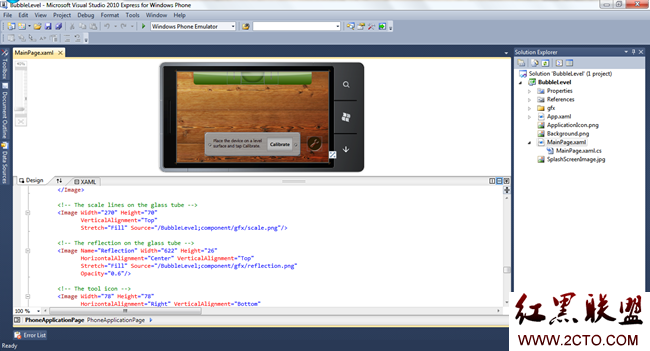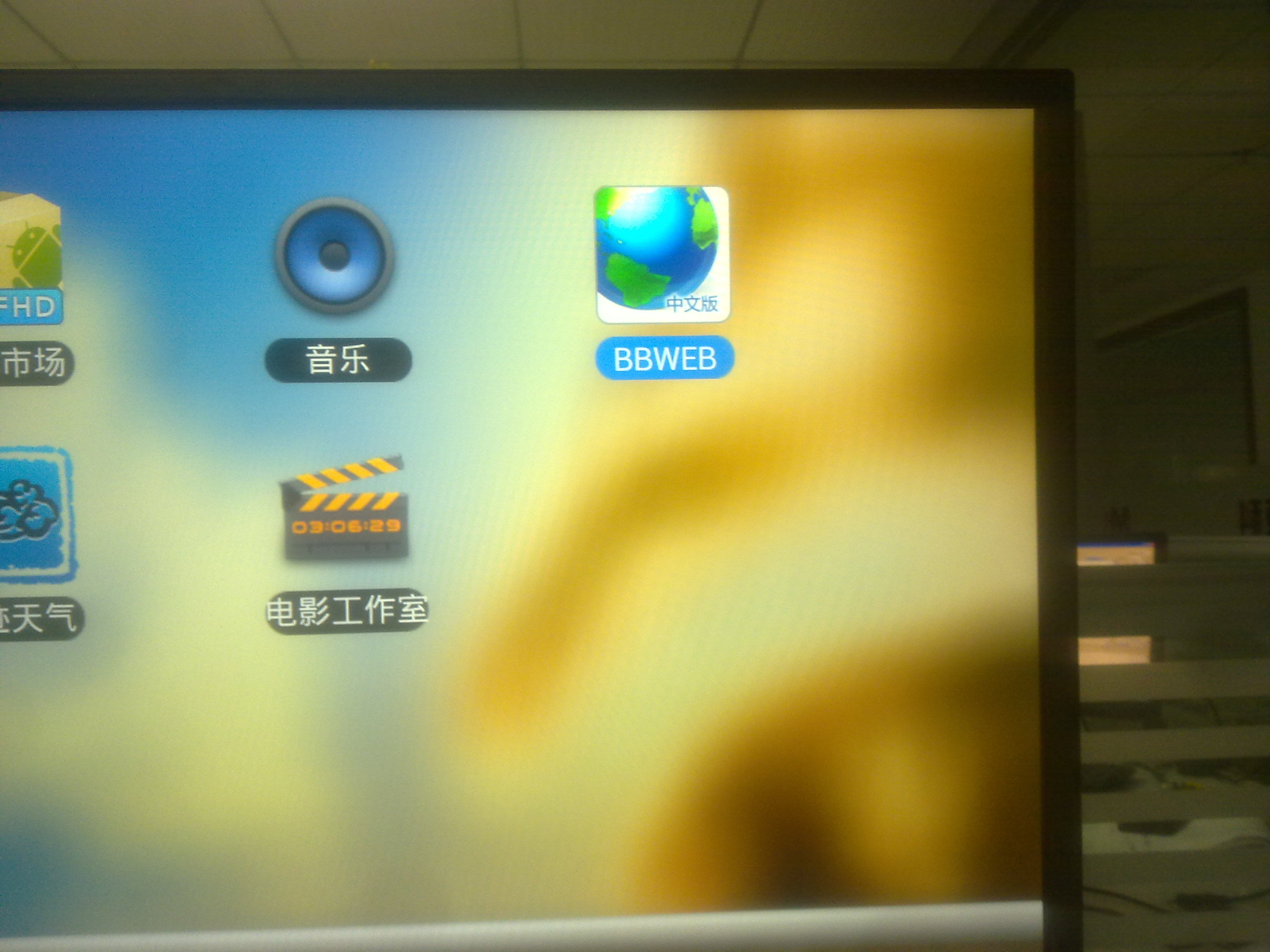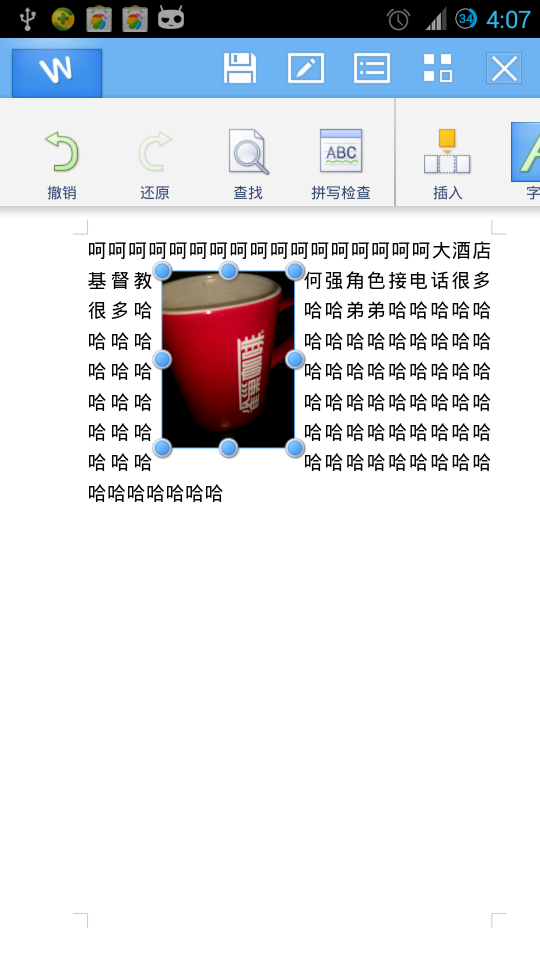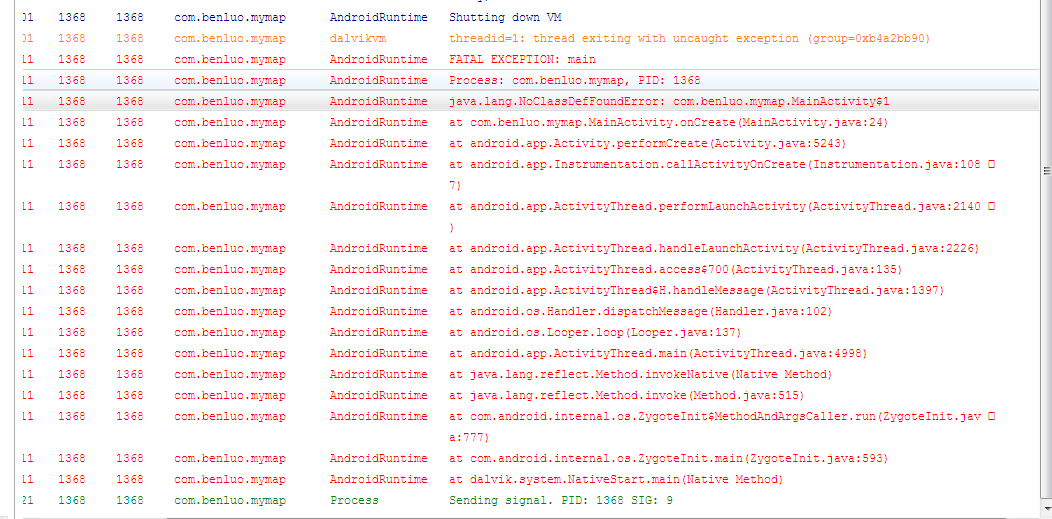简述Android触摸屏手势识别3
手势识别[功能]
何为手势识别? 比如:你在屏幕上从左至右划出的一个动作 这就是手势 能够识别这个的就是 手势识别
[思路]
1. android 有一个手势识别的类:OnGestureListener
2. 在 GestureDetector() 中使用上面的class 即可 系统就会把手势交由该类来处理
[代码]
1. 该类的定义
Java代码
1. public class SampleGuest implements OnGestureListener {
2. Activity activity;
3.
4. public SampleGuest(Activity a){
5. activity = a;
6. }
7.
8. // called automatically, any screen action will Triggered it
9. public boolean onTouchEvent(MotionEvent me){
10. return gesture.onTouchEvent(me);
11. }
12.
13. @Override
14. public boolean onDown(MotionEvent e) {
15. // TODO Auto-generated method stub
16. Log.d("TAG","[+++++++++++][onDown]");
17. return true;
18. }
19.
20. @Override
21. //e1, the begin of ACTION_DOWN MotionEvent
22. //e2, the end of ACTION_DOWN MotionEvent
23. // velocityX, the motion speed in X
24. // velocityY:the motion speed in y
25. public boolean onFling(MotionEvent e1, MotionEvent e2, float velocityX,
26. float velocityY) {
27. // TODO Auto-generated method stub
28. if ((e1.getX() - e2.getX() > VALUE_DISTANCE)
29. && Math.abs(velocityX) > VALUE_SPEED) {
30. Log.d("TAG","[+++++++++++][onFling][Fling left]");
31. } else if ((e2.getX() - e1.getX() > VALUE_DISTANCE)
32. && Math.abs(velocityX) > VALUE_SPEED) {
33. Log.d("TAG","[+++++++++++][onDown][Fling right]");
34.
35. }
36. return true;
37. }
38.
39. @Override
40. public void onLongPress(MotionEvent e) {
41. // TODO Auto-generated method stub
42. Log.d("TAG","[+++++++++++][onLongPress]");
43. }
44.
45. @Override
46. public boolean onScroll(MotionEvent e1, MotionEvent e2, float distanceX,
47. float distanceY) {
48. // TODO Auto-generated method stub
49. Log.d("TAG","[+++++++++++][onScroll]");
50. return true;
51. }
52.
53. @Override
54. public void onShowPress(MotionEvent e) {
55. // TODO Auto-generated method stub
56. Log.d("TAG","[+++++++++++][onShowPress]");
57. }
58.
59. @Override
60. public boolean onSingleTapUp(MotionEvent e) {
61. // TODO Auto-generated method stub
62. Log.d("TAG","[+++++++++++][onSingleTapUp]");
63. return true;
64. }
65.
66. }
public class SampleGuest implements OnGestureListener {
Activity activity;
public SampleGuest(Activity a){
activity = a;
}
// called automatically, any screen action will Triggered it
public boolean onTouchEvent(MotionEvent me){
return gesture.onTouchEvent(me);
}
@Override
public boolean onDown(MotionEvent e) {
// TODO Auto-generated method stub
Log.d("TAG","[+++++++++++][onDown]");
return true;
}
@Override
//e1, the begin of ACTION_DOWN MotionEvent
//e2, the end of ACTION_DOWN MotionEvent
// velocityX, the motion speed in X
// velocityY:the motion speed in y
public boolean onFling(MotionEvent e1, MotionEvent e2, float velocityX,
float velocityY) {
// TODO Auto-generated method stub
if ((e1.getX() - e2.getX() > VALUE_DISTANCE)
&& Math.abs(velocityX) > VALUE_SPEED) {
Log.d("TAG","[+++++++++++][onFling][Fling left]");
} else if ((e2.getX() - e1.getX() > VALUE_DISTANCE)
&& Math.abs(velocityX) > VALUE_SPEED) {
Log.d("TAG","[+++++++++++][onDown][Fling right]");
}
return true;
}
@Override
public void onLongPress(MotionEvent e) {
// TODO Auto-generated method stub
Log.d("TAG","[+++++++++++][onLongPress]");
}
@Override
public boolean onScroll(MotionEvent e1, MotionEvent e2, float distanceX,
float distanceY) {
// TODO Auto-generated method stub
Log.d("TAG","[+++++++++++][onScroll]");
return true;
}
@Override
public void onShowPress(MotionEvent e) {
// TODO Auto-generated method stub
Log.d("TAG","[+++++++++++][onShowPress]");
}
@Override
public boolean onSingleTapUp(MotionEvent e) {
// TODO Auto-generated method stub
Log.d("TAG","[+++++++++++][onSingleTapUp]");
return true;
}
}
(大家可以自己做一些手势 然后看 LogCat 就会知道是什么手势了)
2. 如何使用
Java代码
1. SampleGuest sg = new SampleGuest(this);
2. GestureDetector gesture = new GestureDetector(sg);
1. // 用户轻触触摸屏,由1个MotionEvent ACTION_DOWN触发
2. public boolean onDown(MotionEvent e){}
3.
4. // 用户按下触摸屏、快速移动后松开,由1个MotionEvent ACTION_DOWN,
5. //多个ACTION_MOVE, 1个ACTION_UP触发
6. // e1:第1个ACTION_DOWN MotionEvent
7. // e2:最后一个ACTION_MOVE MotionEvent
8. // velocityX:X轴上的移动速度,像素/秒
9. // velocityY:Y轴上的移动速度,像素/秒
10. // 触发条件 :
11. // X轴的坐标位移大于FLING_MIN_DISTANCE,且移动速度大于FLING_MIN_VELOCITY个像素/秒
12. public boolean onFling(MotionEvent e1, MotionEvent e2, float velocityX,float velocityY){}
13.
14. // 用户长按触摸屏,由多个MotionEvent ACTION_DOWN触发
15. public void onLongPress(MotionEvent e)
16.
17. // 用户按下触摸屏,并拖动,由1个MotionEvent ACTION_DOWN, 多个ACTION_MOVE触发
18. public boolean onScroll(MotionEvent e1, MotionEvent e2, float distanceX,float distanceY)
19.
20. // 用户轻触触摸屏,尚未松开或拖动,由一个1个MotionEvent ACTION_DOWN触发
21. // 注意和onDown()的区别,强调的是没有松开或者拖动的状态
22. public void onShowPress(MotionEvent e)
23.
24. // 用户(轻触触摸屏后)松开,由一个1个MotionEvent ACTION_UP触发
25. public boolean onSingleTapUp(MotionEvent e) --------------------编程问答-------------------- 1.Activity类Rotate.java文件
Java代码
1. package cn.com;
2.
3. import android.app.Activity;
4. import android.os.Bundle;
5.
6. import android.view.GestureDetector;
7. import android.view.MotionEvent;
8. import android.widget.ImageView;
9.
10. public class Rotate extends Activity {
11. GestureDetector gesture;
12.
13. int mCenterX = 160;
14. int mCenterY = 0;
15.
16. ImageView mImageView1;
17. ImageView mImageView2;
18.
19. /** Called when the activity is first created. */
20. @Override
21. public void onCreate(Bundle savedInstanceState) {
22. super.onCreate(savedInstanceState);
23. setContentView(R.layout.main);
24.
25. FlingGuest sg = new FlingGuest(this);
26. gesture = new GestureDetector(sg);
27.
28. mImageView1 = (ImageView) findViewById(R.id.image1);
29. mImageView2 = (ImageView) findViewById(R.id.image2);
30. }
31.
32. public void leftMoveHandle() {
33. Rotate3d leftAnimation = new Rotate3d(0, -90, 0, 0, mCenterX, mCenterY);
34. Rotate3d rightAnimation = new Rotate3d(90, 0, 0.0f, 0.0f, mCenterX,
35. mCenterY);
36.
37. leftAnimation.setFillAfter(true);
38. leftAnimation.setDuration(1000);
39. rightAnimation.setFillAfter(true);
40. rightAnimation.setDuration(1000);
41.
42. mImageView1.startAnimation(leftAnimation);
43. mImageView2.startAnimation(rightAnimation);
44. }
45.
46. public void rightMoveHandle() {
47. Rotate3d leftAnimation = new Rotate3d(0, 90, 0, 0, mCenterX, mCenterY);
48. Rotate3d rightAnimation = new Rotate3d(-90, 0, 0.0f, 0.0f, mCenterX,
49. mCenterY);
50.
51. leftAnimation.setFillAfter(true);
52. leftAnimation.setDuration(1000);
53. rightAnimation.setFillAfter(true);
54. rightAnimation.setDuration(1000);
55.
56. mImageView1.startAnimation(rightAnimation);
57. mImageView2.startAnimation(leftAnimation);
58. }
59.
60. // called automatically, any screen action will Triggered it
61. public boolean onTouchEvent(MotionEvent me) {
62. return gesture.onTouchEvent(me);
63. }
64. }
package cn.com;
import android.app.Activity;
import android.os.Bundle;
import android.view.GestureDetector;
import android.view.MotionEvent;
import android.widget.ImageView;
public class Rotate extends Activity {
GestureDetector gesture;
int mCenterX = 160;
int mCenterY = 0;
ImageView mImageView1;
ImageView mImageView2;
/** Called when the activity is first created. */
@Override
public void onCreate(Bundle savedInstanceState) {
super.onCreate(savedInstanceState);
setContentView(R.layout.main);
FlingGuest sg = new FlingGuest(this);
gesture = new GestureDetector(sg);
mImageView1 = (ImageView) findViewById(R.id.image1);
mImageView2 = (ImageView) findViewById(R.id.image2);
}
public void leftMoveHandle() {
Rotate3d leftAnimation = new Rotate3d(0, -90, 0, 0, mCenterX, mCenterY);
Rotate3d rightAnimation = new Rotate3d(90, 0, 0.0f, 0.0f, mCenterX,
mCenterY);
leftAnimation.setFillAfter(true);
leftAnimation.setDuration(1000);
rightAnimation.setFillAfter(true);
rightAnimation.setDuration(1000);
mImageView1.startAnimation(leftAnimation);
mImageView2.startAnimation(rightAnimation);
}
public void rightMoveHandle() {
Rotate3d leftAnimation = new Rotate3d(0, 90, 0, 0, mCenterX, mCenterY);
Rotate3d rightAnimation = new Rotate3d(-90, 0, 0.0f, 0.0f, mCenterX,
mCenterY);
leftAnimation.setFillAfter(true);
leftAnimation.setDuration(1000);
rightAnimation.setFillAfter(true);
rightAnimation.setDuration(1000);
mImageView1.startAnimation(rightAnimation);
mImageView2.startAnimation(leftAnimation);
}
// called automatically, any screen action will Triggered it
public boolean onTouchEvent(MotionEvent me) {
return gesture.onTouchEvent(me);
}
}
2.手势监听类
Java代码
1. package cn.com;
2.
3. import android.app.Activity;
4. import android.util.Log;
5. import android.view.MotionEvent;
6. import android.view.GestureDetector.OnGestureListener;
7.
8. public class FlingGuest implements OnGestureListener {
9. Activity activity;
10.
11. int VALUE_DISTANCE = 100;
12. int VALUE_SPEED = 20;
13.
14. public FlingGuest(Activity a) {
15. activity = a;
16. }
17.
18. // 用户轻触触摸屏,由1个MotionEvent ACTION_DOWN触发
19. public boolean onDown(MotionEvent e) {
20. Log.d("TAG", "[+++++++++++][onDown]");
21. return true;
22. }
23.
24. // e1, the begin of ACTION_DOWN MotionEvent
25. // e2, the end of ACTION_DOWN MotionEvent
26. // velocityX, the motion speed in X
27. // velocityY:the motion speed in y
28. // 用户按下触摸屏、快速移动后松开,由1个MotionEvent ACTION_DOWN,
29. // 多个ACTION_MOVE, 1个ACTION_UP触发
30. // e1:第1个ACTION_DOWN MotionEvent
31. // e2:最后一个ACTION_MOVE MotionEvent
32. // velocityX:X轴上的移动速度,像素/秒
33. // velocityY:Y轴上的移动速度,像素/秒
34. // 触发条件 :
35. // X轴的坐标位移大于VALUE_DISTANCE,且移动速度大于VALUE_SPEED个像素/秒
36. public boolean onFling(MotionEvent e1, MotionEvent e2, float velocityX,
37. float velocityY) {
38. if ((e1.getX() - e2.getX() > VALUE_DISTANCE)
39. && Math.abs(velocityX) > VALUE_SPEED) {
40. Log.d("TAG", "[+++++++++++][onFling][Fling left]");
41. ((Rotate)activity).leftMoveHandle();
42.
43. } else if ((e2.getX() - e1.getX() > VALUE_DISTANCE)
44. && Math.abs(velocityX) > VALUE_SPEED) {
45. Log.d("TAG", "[+++++++++++][onDown][Fling right]");
46. ((Rotate)activity).rightMoveHandle();
47. }
48. return true;
49. }
50.
51. // 用户长按触摸屏,由多个MotionEvent ACTION_DOWN触发
52. public void onLongPress(MotionEvent e) {
53. Log.d("TAG", "[+++++++++++][onLongPress]");
54. }
55.
56. // 用户按下触摸屏,并拖动,由1个MotionEvent ACTION_DOWN, 多个ACTION_MOVE触发
57. public boolean onScroll(MotionEvent e1, MotionEvent e2, float distanceX,
58. float distanceY) {
59. Log.d("TAG", "[+++++++++++][onScroll]");
60. return true;
61. }
62.
63. // 用户轻触触摸屏,尚未松开或拖动,由一个1个MotionEvent ACTION_DOWN触发
64. // 注意和onDown()的区别,强调的是没有松开或者拖动的状态
65. public void onShowPress(MotionEvent e) {
66. Log.d("TAG", "[+++++++++++][onShowPress]");
67. }
68.
69. // 用户(轻触触摸屏后)松开,由一个MotionEvent ACTION_UP触发
70. public boolean onSingleTapUp(MotionEvent e) {
71. Log.d("TAG", "[+++++++++++][onSingleTapUp]");
72. return true;
73. }
74.
75. } --------------------编程问答-------------------- 3.Rotate3d.java动画辅助类
Java代码
1. package cn.com;
2.
3. import android.graphics.Camera;
4. import android.graphics.Matrix;
5. import android.view.animation.Animation;
6. import android.view.animation.Transformation;
7.
8. public class Rotate3d extends Animation {
9. private float mFromDegree;
10. private float mToDegree;
11. private float mCenterX;
12. private float mCenterY;
13. private float mLeft;
14. private float mTop;
15. private Camera mCamera;
16. private static final String TAG = "Rotate3d";
17.
18. public Rotate3d(float fromDegree, float toDegree, float left, float top,
19. float centerX, float centerY) {
20. this.mFromDegree = fromDegree;
21. this.mToDegree = toDegree;
22. this.mLeft = left;
23. this.mTop = top;
24. this.mCenterX = centerX;
25. this.mCenterY = centerY;
26.
27. }
28.
29. @Override
30. public void initialize(int width, int height, int parentWidth,
31. int parentHeight) {
32. super.initialize(width, height, parentWidth, parentHeight);
33. mCamera = new Camera();
34. }
35.
36. @Override
37. protected void applyTransformation(float interpolatedTime, Transformation t) {
38. final float FromDegree = mFromDegree;
39. float degrees = FromDegree + (mToDegree - mFromDegree)
40. * interpolatedTime;
41. final float centerX = mCenterX;
42. final float centerY = mCenterY;
43. final Matrix matrix = t.getMatrix();
44.
45. if (degrees <= -76.0f) {
46. degrees = -90.0f;
47. mCamera.save();
48. mCamera.rotateY(degrees);
49. mCamera.getMatrix(matrix);
50. mCamera.restore();
51. } else if (degrees >= 76.0f) {
52. degrees = 90.0f;
53. mCamera.save();
54. mCamera.rotateY(degrees);
55. mCamera.getMatrix(matrix);
56. mCamera.restore();
57. } else {
58. mCamera.save();
59. //
60. mCamera.translate(0, 0, centerX);
61. mCamera.rotateY(degrees);
62. mCamera.translate(0, 0, -centerX);
63. mCamera.getMatrix(matrix);
64. mCamera.restore();
65. }
66.
67. matrix.preTranslate(-centerX, -centerY);
68. matrix.postTranslate(centerX, centerY);
69. }
70. }
package cn.com;
import android.graphics.Camera;
import android.graphics.Matrix;
import android.view.animation.Animation;
import android.view.animation.Transformation;
public class Rotate3d extends Animation {
private float mFromDegree;
private float mToDegree;
private float mCenterX;
private float mCenterY;
private float mLeft;
private float mTop;
private Camera mCamera;
private static final String TAG = "Rotate3d";
public Rotate3d(float fromDegree, float toDegree, float left, float top,
float centerX, float centerY) {
this.mFromDegree = fromDegree;
this.mToDegree = toDegree;
this.mLeft = left;
this.mTop = top;
this.mCenterX = centerX;
this.mCenterY = centerY;
}
@Override
public void initialize(int width, int height, int parentWidth,
int parentHeight) {
super.initialize(width, height, parentWidth, parentHeight);
mCamera = new Camera();
}
@Override
protected void applyTransformation(float interpolatedTime, Transformation t) {
final float FromDegree = mFromDegree;
float degrees = FromDegree + (mToDegree - mFromDegree)
* interpolatedTime;
final float centerX = mCenterX;
final float centerY = mCenterY;
final Matrix matrix = t.getMatrix();
if (degrees <= -76.0f) {
degrees = -90.0f;
mCamera.save();
mCamera.rotateY(degrees);
mCamera.getMatrix(matrix);
mCamera.restore();
} else if (degrees >= 76.0f) {
degrees = 90.0f;
mCamera.save();
mCamera.rotateY(degrees);
mCamera.getMatrix(matrix);
mCamera.restore();
} else {
mCamera.save();
//
mCamera.translate(0, 0, centerX);
mCamera.rotateY(degrees);
mCamera.translate(0, 0, -centerX);
mCamera.getMatrix(matrix);
mCamera.restore();
}
matrix.preTranslate(-centerX, -centerY);
matrix.postTranslate(centerX, centerY);
}
}
4.main.xml
Java代码
1. <?xml version="1.0" encoding="utf-8"?>
2. <RelativeLayout xmlns:android="http://schemas.android.com/apk/res/android"
3. android:orientation="vertical" android:layout_width="fill_parent"
4. android:layout_height="wrap_content">
5. <ImageView android:id="@+id/image2" android:layout_width="fill_parent"
6. android:layout_height="fill_parent" android:background="@drawable/two" />
7. <ImageView android:id="@+id/image1" android:layout_width="fill_parent"
8. android:layout_height="fill_parent" android:background="@drawable/one" />
9. </RelativeLayout> --------------------编程问答-------------------- 受教了,高手呀 --------------------编程问答-------------------- --------------------编程问答-------------------- 好贴,帮顶了。。。。。。。。。。。 --------------------编程问答--------------------

补充:移动开发 , Android




